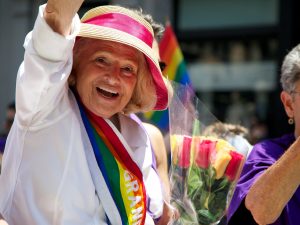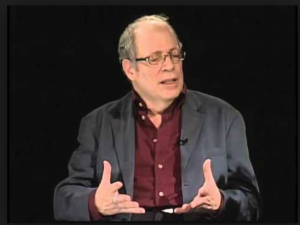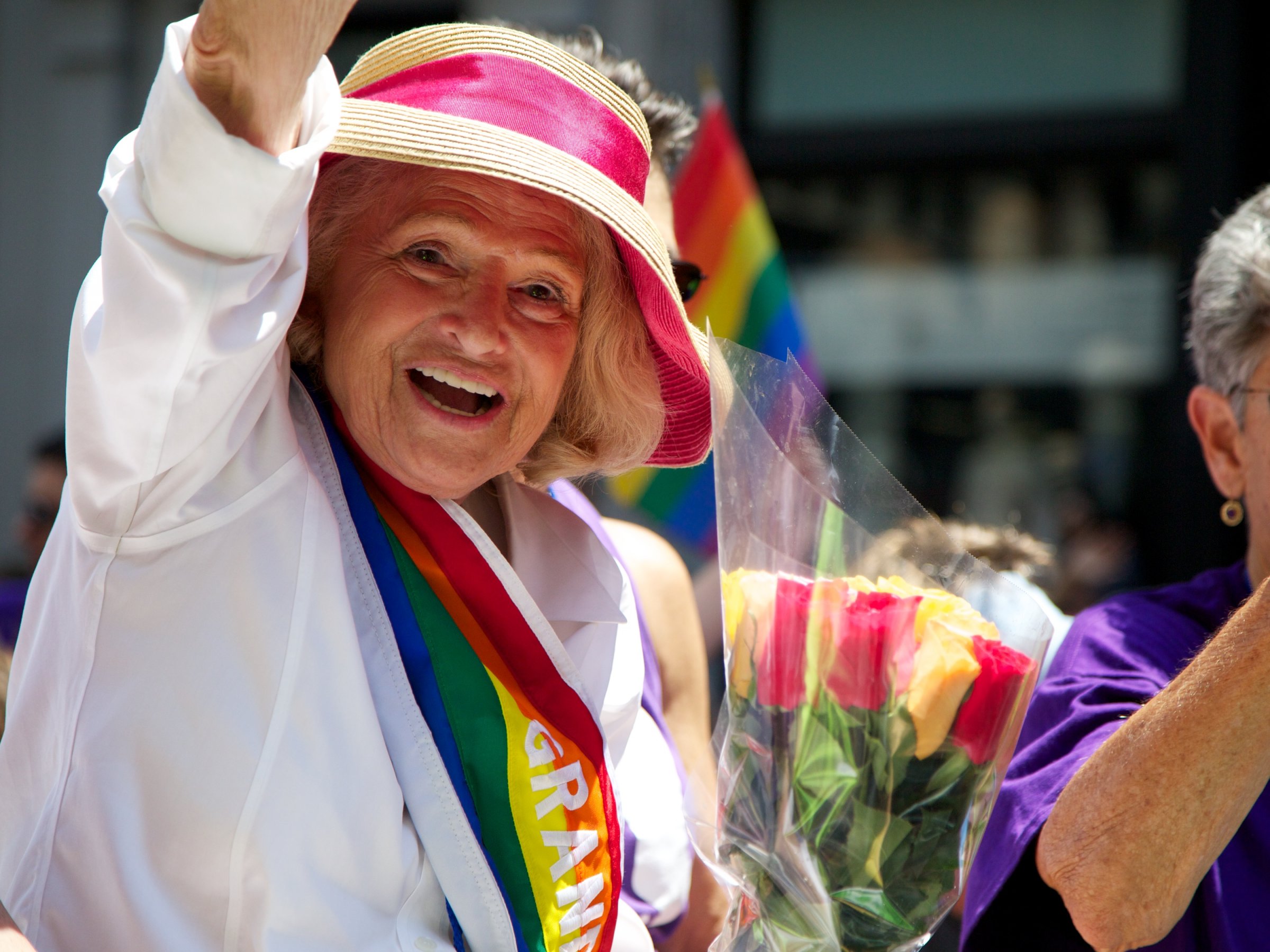IN KEEPING WITH this magazine’s annual tradition, we remember here the activists, writers, artists, entertainers, and other notable members of the LGBT community, and some allies, who died over the past twelve months. Please note that all deaths occurred in 2017 unless otherwise indicated.
Activists and Public Figures
Gilbert Baker, creator of the iconic rainbow flag, died on March 31st at age 65. After having settled in the early 1970s in San Francisco, where he used his sewing talents to create costumes for his drag performances, he often designed banners for protests and marches, calling himself “the gay Betsy Ross.” In 1978, at the request of Harvey Milk, he designed “an emblem to represent the movement,” as one obituary put it. The original flag was acquired by the Museum of Modern Art in 2015.
Christopher Collins, an hiv/aids activist, died on January 3rd at age 37. He was an HIV prevention counselor at Philadelphia’s Mazzoni Center, where he was lauded for his outreach and lifesaving work with LGBT people of color. Active in many programs in Philadelphia, including The Colors Organization and Gay Men’s Health Leadership Academy, he was remembered as “a beautiful spirit.”
Larry Copeland, politician and activist, died on September 5th at age seventy. In 1974, he cofounded “Portland Town Council,” Oregon’s first mainstream advocacy group for gay and lesbian rights, and in 1982 he became Oregon’s first openly gay person to run for office, in a bid for Portland City Commissioner. He helped establish crisis hotlines and legal services for the LGBT community, and was honored in 1999 by Portland’s Equity Foundation as “the pioneer in gay and lesbian civil rights” in Oregon. He is survived by his partner Frank Blas.
Jim Graham, attorney and politician, died on June 11th at age 71. During the height of the AIDS crisis, he served as executive director of the Whitman-Walker Clinic in Washington, D.C., providing legal advice to gay men dying of AIDS who had no financial resources. Later, he was elected to four terms on the D.C. City Council, where he was its second openly gay member. He introduced or backed many progressive bills to benefit the LGBT community. He is survived by his partner Christopher Watkins.
Gregory Lugliani, an hiv/aids activist and writer, died on July 8th at age 58. He joined ACT UP in 1988, after having moved to New York from California. He headed communications at Gay Men’s Health Crisis and was communications director for the NAMES Project Foundation/AIDS Memorial Quilt. He was also editor and contributing writer for POZ magazine. In the last part of his career, he worked in public affairs at a strategic consulting company on HIV treatment and prevention programs.
Kate Millett, a leading second-wave feminist and author of the 1970 bestseller Sexual Politics, died on September 6th at age 82. She will remembered at length in the next issue.
Celeste Newbrough, activist and writer, died on August 4th at age 77. An organizer against the 1978 Briggs Initiative, which if passed would have barred gays and lesbians from working in California public schools, she helped fund the creation of Gilbert Baker’s rainbow flag (see his obituary, above) and chaired pioneering meetings that launched the San Francisco LGBT rights movement. An editor and writer, her last book was Angel of Polk Street (2017), a novel about a transgender teen. She is survived by longtime partner, Ilona Pivar, a psychologist, to whom she was married.
William A. Norris, retired judge, died on January 21st at age 89. While serving on the U.S. Ninth Circuit Court of Appeals, he wrote a majority decision in 1988 in the case of Watkins v. U.S. Army, ruling that gay people had the same constitutional protections as racial minorities. It overturned the mandatory discharge of Staff Sgt. Perry J. Watkins for acknowledging that he was gay. This ruling is widely seen as the first to use equal protection as an argument for gay equality. Norris’ autobiography, Liberal Opinions: My Life in the Stream of History, was published in 2016.
Gina Quattrochi, pioneer in AIDS housing programs, died on December 13, 2016, at age 63. Her involvement in the AIDS crisis began while she was the associate general counsel for the New York State Nurses Association. The deaths of many friends led her to take action, and she was instrumental in founding the first group residence for people with AIDS in New York. For a quarter century, she was the AIDS Resource Center’s chief executive and also helped found the National AIDS Housing Coalition. She is survived by her children and former partner, Priscilla Lenes.
Chuck Renslow, activist and businessman, died on June 29th at age 87. Considered a “longtime pillar of the LGBTQ community in Chicago and around the world,” in the 1950s he founded Kris Studios, a physique photography house, and was deeply involved in local politics and LGBT issues. He was cofounder of the Leather Archives and Museum in Chicago and publisher of numerous gay men’s magazines and newspapers. He opened Gold Coast, believed to be the first leather bar in the U.S., and was the recipient of many awards. He was inducted into the Chicago LGBT Hall of Fame in 1991. A biography was published that same year titled Leatherman: The Legend of Chuck Renslow, by Tracy Baim and Owen Keehnen.
John Schenck, an equal rights activist, died on December 28, 2016, at age 67. He founded Arkansas’ longest-running Pride parade, in the city of Conway. Schenck and Robert Loyd, who died last year, were subjected to years of verbal and physical harassment by homophobic residents of their town, as well as by police. They were legally married in Canada in 2004 and later were plaintiffs in Wright v. Arkansas, which challenged the state’s same-sex marriage ban. The couple’s home of thirty years will be turned into a museum, said Schenck’s son.
Charley Shively, activist, writer, educator, died on October 6th at age 79. He is remembered in this issue by Michael Bronski.
Rick Stafford, political adviser and organizer, died on September 2nd at age 65. In 1993, he made history as the first openly gay chair of a major U.S. political party, Minnesota’s Democratic-Farm-Labor (DFL) Party, which was created in 1944 by Hubert Humphrey. Called “a consummate insider’s insider,” he was a mentor and adviser to many in state politics. He was a board member of the National Stonewall Democrats and chair of the national LGBT caucus of the Democratic National Committee.
Edie Windsor (born Edith Schlain), same-sex marriage activist, died on September 12th at age 88. Windsor  had been living with Thea Spyer for forty years when the latter became ill. The couple married in Toronto in 2007, and Spyer died two years later. Windsor inherited her estate, but when the IRS forced her to pay taxes on it, she sued the IRS. Windsor became the plaintiff in Windsor v. U.S., the case that led the Supreme Court to rule that same-sex couples had a constitutional right to marry anywhere in the U.S., with all the protections and privileges of heterosexual couples. The story of this decision is explored in the documentary film Edie & Thea: A Very Long Engagement (2009). She is survived by Judith Kasen-Windsor, whom she married in 2016.
had been living with Thea Spyer for forty years when the latter became ill. The couple married in Toronto in 2007, and Spyer died two years later. Windsor inherited her estate, but when the IRS forced her to pay taxes on it, she sued the IRS. Windsor became the plaintiff in Windsor v. U.S., the case that led the Supreme Court to rule that same-sex couples had a constitutional right to marry anywhere in the U.S., with all the protections and privileges of heterosexual couples. The story of this decision is explored in the documentary film Edie & Thea: A Very Long Engagement (2009). She is survived by Judith Kasen-Windsor, whom she married in 2016.
Artists and Entertainers
Thomas Derrah, character actor, died on October 5th at age 64. He appeared on Broadway in Jackie: An American Life, as well as in countless Off-Broadway and regional productions, but was best known for the roles he played in over 100 plays at the American Repertory Theater (ART) in Cambridge, Mass., of which he was a founding member. He also appeared in numerous films and received several awards, including an Elliot Norton Prize for Sustained Excellence. He is survived by his spouse, actor–playwright John Kuntz.
D. Disalvatore (born Julie Disalvatore), filmmaker and writer, died on August 24th at age 51. Her films include A Marine Story (2010), which took on the “Don’t ask, don’t tell” policy, and Shelter (2007), winner of a glaad Media Award, among other plaudits. She was film festival manager for L.A.’s Outfest and wrote for many magazines and newspapers, as well as for her blog, “The Smoking Cocktail,” which covered LGBT arts, culture, and politics. She served on the Board of Directors of the L.A. Gay and Lesbian Chamber of Commerce, was a mentor for the Point Foundation, and was one of Go magazine’s “100 Women We Love.”
Max Ferrá, director, died on February 4th at age 79. A trailblazer for Latino theater, in the 1960s he founded, and was the first artistic director of, the Off-Broadway intar Hispanic American Arts Center, dedicated to producing works (in English) of Latino/a playwrights, such as Carmelita Tropicana, Manuel Puig, and Nilo Cruz. Born in Cuba, he arrived in the U.S. a year before Castro came to power. Later in his career, he moved to Miami, where he continued to direct. He is survived by his partner, Winston Gonzalez.
Michael Friedman, a prolific composer and lyricist, died on September 9th at age 41. Among many other  theatrical ventures, he was co-creator of Bloody Bloody Andrew Jackson, which opened on Broadway in 2010 after a successful Off-Broadway run, and the 2010 Signature Theatre revival of Angels in America. At the time of his death, he was artistic director of New York City Center’s Encores! Off-Center series and was working on numerous projects, one of which was a sequel to A Chorus Line. He died of complications from AIDS only nine weeks after having been diagnosed, and was remembered at length in The New York Times (Oct. 11, 2017).
theatrical ventures, he was co-creator of Bloody Bloody Andrew Jackson, which opened on Broadway in 2010 after a successful Off-Broadway run, and the 2010 Signature Theatre revival of Angels in America. At the time of his death, he was artistic director of New York City Center’s Encores! Off-Center series and was working on numerous projects, one of which was a sequel to A Chorus Line. He died of complications from AIDS only nine weeks after having been diagnosed, and was remembered at length in The New York Times (Oct. 11, 2017).
Gila Goldstein (born Avraham Goldstein), considered by many to be Israel’s first openly transgender person, died on February 5th at age 69. In younger years she was a sex worker and dancer, later turning to acting and singing. A documentary about her life, That’s Gila, That’s Me, was made in 2010. She lent her name to Tel Aviv’s Project Gila, the movement for transgender empowerment in Israel, which began in 2011.
Howard Hodgkin, painter, died on March 9th at age 84. Described as one of Britain’s greatest contemporary artists, he painted on wood, not canvas, and described himself as “a figurative painter of emotional situations.” He represented Britain at the 1984 Venice Biennale, won the Turner Prize in 1985, and was knighted in 1992. A comprehensive book about his work, titled Howard Hodgkin, written by Andrew Graham-Dixon, went into a second edition in 2001. He is survived by his partner, music critic Antony Peattie, and by children from a previous marriage.
William M. Hoffman, playwright and librettist, died on April 29th at age 78. His play, As Is (1985), was the  one of the first Broadway productions (along with Larry Kramer’s The Normal Heart) to focus on AIDS. It opened Off-Broadway and moved to Broadway, winning an Obie and a Drama Desk award for Outstanding New Play. It was nominated for three Tonys, including Best Play, and was made into a TV movie in 1986. The author of many plays, he wrote the libretto for The Ghosts of Versailles, which was based in part on his experiences at Caffe Cino. Commissioned by James Levine, it premiered at the Metropolitan Opera in 1991. It starred such luminaries as Renée Fleming and Marilyn Horne and was the first new opera performed there since 1967. He is survived by his spouse, William Russell Taylor II.
one of the first Broadway productions (along with Larry Kramer’s The Normal Heart) to focus on AIDS. It opened Off-Broadway and moved to Broadway, winning an Obie and a Drama Desk award for Outstanding New Play. It was nominated for three Tonys, including Best Play, and was made into a TV movie in 1986. The author of many plays, he wrote the libretto for The Ghosts of Versailles, which was based in part on his experiences at Caffe Cino. Commissioned by James Levine, it premiered at the Metropolitan Opera in 1991. It starred such luminaries as Renée Fleming and Marilyn Horne and was the first new opera performed there since 1967. He is survived by his spouse, William Russell Taylor II.
Albert Innaurato, playwright, died on September 24th at age seventy. His biggest hit was Gemini, which opened on Broadway in 1977 and ran for 1,819 performances, making it the longest running non-musical from the past seventy years. To date, it is the fourth-longest-running play in Broadway history. The plot centers around a Harvard student who comes home for his 21st birthday and has to deal with being gay. The play was made into a movie in 1980 (Happy Birthday Gemini), briefly revived Off-Broadway in 1999, and turned into a stage musical in 2004 (Gemini the Musical). His subsequent plays were not as well received. He wrote for television and was passionate about opera, writing for a number of opera publications as well as directing and consulting.
John Mace, vocal coach and same-sex marriage activist, died on May 8th at age 97. He met Richard Prahl (who later took the stage name Richard Adrian Dorr) in 1948 at Juilliard. They established a private coaching business, John Mace Vocal Studio, which he and Dorr (who died in 2016) ran together, where they trained opera singers and many musical theater stars, including Bette Midler. Increasingly vexed about not being able to marry, the two became involved in the Freedom to Marry online advertising campaign in 2011. They were interviewed in a two-minute video, which features photographs of their lives together. By the following year, they were able to marry legally in New York.
David Mancuso, a DJ and self-described “musical host,” died on November 14th, 2016, at age 72. In 1970, he founded the “first underground dance party,” The Loft, as a safe space for members of the LGBT community. Because neither food nor drinks were served there, it was exempt from New York’s stringent cabaret laws, and it paved the way for other clubs such as Paradise Garage and the Saint. Some music historians have considered The Loft to be the birthplace of disco. Mancuso was inducted into the Dance Music Hall of Fame in 2005.
Alec McCowen, British character actor, died on February 6th at age 91. Widely admired for a lifetime of stage and screen performances in Britain and the U.S., he joined the Old Vic in 1959. He earned a Tony nomination in 1969 for his portrayal of Pope Hadrian in Hadrian VII, by Peter Luke. His memoirs include Young Gemini (1979) and A Double Bill (1980). He was predeceased by his partner, stage and TV actor Geoffrey Burridge.
George Michael (born Georgios Kyriacos Panayiotou), singer and songwriter, died on December 26, 2016, at age 53. He was remembered in a cover article by Colin Carman in the March-April 2017 issue.
Stuart J. Thompson, Australian-born Broadway producer, died on August 17th at age 62. He was general manager of more than seventy Broadway, Off-Broadway, and national touring productions, won six Tony awards (including God of Carnage for Best Play in 2009 and Death of a Salesman for best revival in 2012), and was nominated for twenty. He served on the board of the Broadway League and Broadway Cares/Equity Fights AIDS. The lights of Broadway were dimmed for a moment to mark his passing. He is survived by his spouse, Joseph R. Baker III, president of the Medicare Rights Center.
Diane Torr, artist and activist, died on May 31st at age 68. Born in Canada, she grew up in Scotland and England, spending most of her adult life in New York, where she was a pioneer in performative female-to-male gender crossing. She started out as a go-go dancer and went on to co-found the WOW (Women’s One World) Café Theatre in the East Village. She developed drag king workshops, presenting them across Europe and appearing on American TV. She co-authored Sex, Drag and Male Roles (2010), and her work was the focus of a documentary, Man for a Day (2012). She is survived by a daughter from an early marriage.
Writers and Educators
John Ashbery, Pulitzer Prize-winning poet, died on September 3rd at age ninety. His obituary, written by Alfred Corn, appeared in the November-December issue.
Juan Goytisolo, acclaimed as one of Spain’s greatest writers, died on January 5th at age 86. He grew up in chaotic circumstances during the Spanish Civil War, with a father who was violently homophobic and a grandfather who was probably gay. He wrote dozens of works of fiction and nonfiction, all banned under Franco’s regime but published in other Spanish-speaking countries. Marks of Identity (1966) was a novelized version of his life, and his two-volume memoir, Forbidden Territory and Realms of Strife, was published in the late 1980s. Goytisolo’s literary mentor was Jean Genet, to whom he was introduced by his wife, the late writer Monique Lange. Goytisolo, who took many lovers throughout his life but remained very attached to Lange, lived much of his life in Marrakech, where he created a family of choice. He was awarded the Cervantes Prize in 2014.
Rudy Kikel, a poet and an editor, died on May 23rd at age 75. Based in Boston, he was for many years the arts and entertainment editor of Bay Windows, a weekly gay newspaper, and has been credited with giving that paper its name. He edited two volumes of poetry under the title Gents, Bad Boys & Barbarians (1995 and 2004), and published several works of his own poetry, most recently Period Pieces (1997). His weekly column in Bay Windows, “One of Us,” profiled many LGBT individuals over the years. Selected interviews were later compiled as One of Us: LGBT Voices from New England (2014). He is survived by his spouse, Sterling Giles.
Henry McClurg, publisher, died on September 16th at age 70. In 1974, he launched the first of his many gay publications, Contact, a magazine covering Houston’s bar scene that he later sold to the Advocate. Over the decades, his publishing empire included many Texas and Gulf state gay newspapers and magazines, including the Montrose Star, Houston’s first gay newspaper.
Mark Merlis, novelist, died on August 15th at age 67. He was remembered in two obituaries, by Richard Canning and Paul Russell, in the November-December issue.
Ruth Mountaingrove (born Ruth Shook), poet, photographer, and writer, died on December 18, 2016, at age 93. She was co-founder of Rootworks, an intentional lesbian community in Oregon, and co-founded, with her partner June Mountaingrove, a feminist journal called Womanspirit and a photography magazine called Blatant Image. Her life story, told in videotapes, is housed at the archives and special collections of the University of Oregon.
Rip Naquin (born Robert Naquin), publisher and activist, died on August 8th at age 63. He organized the annual Southern Decadence celebration in New Orleans, a six-day extravaganza for the LGBT community that began in 1972. An organizer of philanthropic events, he turned Southern Decadence into a fundraising event. He cofounded Ambush magazine in Baton Rouge in 1983, moving it to New Orleans three years later. He and Martin Greeson (also known as Marsha Delain) became Louisiana’s first legally recognized gay couple in 1993 when New Orleans allowed couples to register as domestic partners.
Stuart Timmons, a writer and historian, died on January 28th at age 60. He was remembered in an obituary by Trebor Healey in the July-August issue.
Robert A. Wilson, writer, publisher, and bookseller, died on November 29, 2016, at age 94. The owner of the Phoenix Book Shop in Greenwich Village, he was friends with Beat poets and writers and was deeply immersed in the Village scene. He published dozens of bibliographies of such writers as Gertrude Stein, Jack Kerouac, Elizabeth Bishop, and Gregory Corso, and his store became a hangout for many writers. After 26 years in operation, he closed the Phoenix in 1988, sold his inventory, and moved to Maryland. He published a memoir titled Seeing Shelley Plain: Memories of New York’s Legendary Phoenix Book Shop in 2001. He was predeceased by composer Kenneth Doubrava, to whom he was married.
Psychologists and Scientists
Judith Bradford, scientist, died on February 11th at age 73. Based for much of her career at Fenway Health in Boston, she was considered a pioneer in LGBT health research. Her career began in 1983 during the AIDS crisis, after which she created the National Lesbian Health Care Survey, considered a landmark study. She was the first researcher to receive funding from the National Institutes of Health (NIH) to train the next generation of LGBT health researchers. She is survived by Nannette L. Dumas, to whom she was married.
Emily Sisley, psychologist and writer, died on October 21, 2016, at age 86. She co-authored, with the late lesbian novelist Bertha Harris, The Joy of Lesbian Sex: A Tender and Liberated Guide to the Pleasures and Problems of a Lesbian Lifestyle. It was published in 1977 (reprinted in 1985) as a companion volume to Charles Silverstein and Edmund White’s Joy of Gay Sex, and it was considered one of the earliest lesbian sex manuals, described by Publishers Weekly as “one of the most lucid celebrations of female eroticism published in our time.”
George Weinberg, psychotherapist and writer, died on March 21st at age 87. A lifelong friend of the LGBT community, he said that he had been influenced by many gay friends and figures beloved in history and literature, whom he later learned were probably gay. Weinberg coined the word “homophobia” in 1965 for a speech he gave at the East Coast Homophile Organization (ECHO). Weinberg’s best-known book was Society and the Healthy Homosexual (1972; 2nd edition, 1991), which was considered to be revolutionary when it was first published.
Sources
Websites: arktimes.com, awiderbridge.org, baywindows.com, bestofneworleans.com, bostonglobe.com, chicagotribune.com, dfl.org, ebar.com, gaycitynews.nyc, LGBTQarchive.com, katemillett.com, latimes.com, legacy.com, losangelesedgemedianetwork.com, miamiherald.com, moma.org, nola.com, nytimes.com, obits.oregonlive.com, out.com, playbill.com, presspassq.blogspot.com, slate.com/blogs, startribune.com, theguardian.com, times-standard.com, twincities.com, washingtonblade.com, wbur.org, westviewnews.org.
Also: Murphy, Pat. “Lesbian Lists.” Whole Earth Review, no. 75, 1992, p. 101, retrieved from Expanded Academic ASAP; New York Times Display Ad, Oct 21, 1977, p. 81, retrieved from ProQuest Historical Newspapers.
Photo Credits Edie Windsor: Robert Libetti; Michael Friedman: Tristan Fuge; William M. Hoffman: from Conversations with William M. Hoffman, Part 1 (video).
Martha E. Stone is the literary editor of this magazine.



